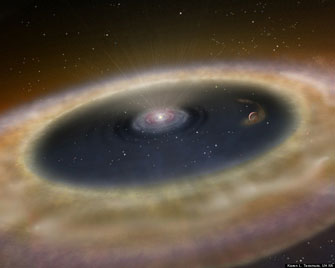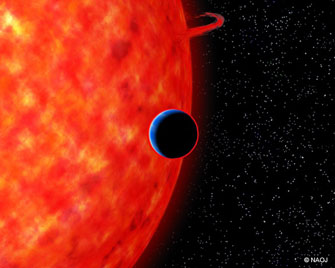Planets and Planetary Systems
One of the most surprising findings of planet hunting campaigns, including the successful Kepler mission, is that a large fraction of the observed exoplanets are very close to their parent stars. Many of these are low mass and low density very unlike the planets in our own solar system. In some cases systems of four or more planets are packed within 0.4 Astronomical Units (Mercury’s orbit of the sun). The discovery of planets so close to their parent star raises important questions such as: Can planets form in such extreme environments? Did the planets form at larger separations and migrate to their current location? How do planets evolve over billions of years in such extreme environments? What were the properties of the protoplanetary discs that led to the formation of planets? Progress in astronomical observations cannot probe the very interior of the inner regions of protoplanetary disks where much of the planet-forming processes should take place, and are inevitably limited in resolution. Meteorites are invaluable tangible witnesses to the formation of our own planetary system and substantial advances are being made in the analytical techniques used to study them.
Meteorites provide a wealth of data to constrain models and begin to resolve the chronology of events of the few million years of lifetime of our protoplanetary disk.
At CITA theorists are trying to answer some of these questions by linking studies of protoplanetary discs with studies of exoplanets. They are proposing
- models of how such planets could form in these hostile environments close to their central star, and comparing these models to any possible signatures in the exoplanet data;
- using numerical hydrodynamic simulations and analytical theory to study the interaction between forming planets and their birth environment in order to characterize how planets will migrate and evolve in a protoplanetary disc during the earliest stages of their evolution;
- using clues from meteorites and comets to understand the early evolution of our solar system, and understanding the evolution and formation of small solid particles and chondrules in particular may represent the initial building blocks for planets;
- studying how exoplanets evolve over billion year time-scales as planets very close to their parent stars undergo extreme evaporation during their lifetime, trying to connect the exoplanet population we see today with the planet population at birth by accounting for this evaporation.
The quasi-universality of chondrule size as a constraint for chondrule formation models
Jacquet E.
Icarus (in press), (2014)
arxiv: 1401.3721.
Black Hole-Neutron Star Mergers with a Hot Nuclear Equation of State: Outflow and Neutrino-cooled Disk for a Low-mass, High-spin Case
Lin, Min-Kai
Monthly Notices of the Royal Astronomical Society, Volume 437, Issue 1, p.575-587http://arxiv.org/abs/1310.1393
arxiv:1310.1393
Lin, Min-Kai; Cloutier, Ryan
Exploring the Formation and Evolution of Planetary Systems, Proceedings of the International Astronomical Union, IAU Symposium, Volume 299, pp. 218-219 (01/2014)
arxiv:1401.5060
Characterizing thermal sweeping: a rapid disc dispersal mechanism
Owen, James E.; Hudoba de Badyn, Mathias; Clarke, Cathie J.; Robins, Luke
Monthly Notices of the Royal Astronomical Society, Volume 436, Issue 2, p.1430-1438 (12/2013)
arxiv:1309.0508
Short duration thermal metamorphism in CR chondrites
Briani, G.; Quirico, E.; Gounelle, M., et al. (Jacquet, E.)
Geochimica et Cosmochimica Acta, Volume 122, p. 267-279 (12/2013)
Testing protoplanetary disc dispersal with radio emission
Owen, James E.; Scaife, Anna M. M.; Ercolano, Barbara
Monthly Notices of the Royal Astronomical Society, Volume 434, Issue 4, p.3378-3388
arxiv:1307.2240
Trace element geochemistry of CR chondrite metal
Jacquet, Emmanuel; Paulhiac-Pison, Marine; Alard, Olivier; Kearsley, Anton T.; Gounelle, Matthieu
Meteoritics & Planetary Science, Volume 48, Issue 10, pp. 1981-1999. (10/2013)
Kepler Planets: A Tale of Evaporation
Owen, James E.; Wu, Yanqin
The Astrophysical Journal, Volume 775, Issue 2, article id. 105, 12 pp. (2013)
arxiv:1303.3899
Water transport in proto-planetary disks and the hydrogen isotopic composition of chondrites.
*Jacquet E.*, Robert F.
Icarus, 223, 722-732, 2013.
Emmanuel Jacquet
Jérémy Leconte
Min-Kai Lin
James Owen
Christa Van Laerhoven
Kathryn Volk
The quasi-universality of chondrule size as a constraint for chondrule formation models
Jacquet E.
Icarus (in press), (2014)
arxiv: 1401.3721.
Black Hole-Neutron Star Mergers with a Hot Nuclear Equation of State: Outflow and Neutrino-cooled Disk for a Low-mass, High-spin Case
Lin, Min-Kai
Monthly Notices of the Royal Astronomical Society, Volume 437, Issue 1, p.575-587http://arxiv.org/abs/1310.1393
arxiv:1310.1393
Lin, Min-Kai; Cloutier, Ryan
Exploring the Formation and Evolution of Planetary Systems, Proceedings of the International Astronomical Union, IAU Symposium, Volume 299, pp. 218-219 (01/2014)
arxiv:1401.5060
Characterizing thermal sweeping: a rapid disc dispersal mechanism
Owen, James E.; Hudoba de Badyn, Mathias; Clarke, Cathie J.; Robins, Luke
Monthly Notices of the Royal Astronomical Society, Volume 436, Issue 2, p.1430-1438 (12/2013)
arxiv:1309.0508
Short duration thermal metamorphism in CR chondrites
Briani, G.; Quirico, E.; Gounelle, M., et al. (Jacquet, E.)
Geochimica et Cosmochimica Acta, Volume 122, p. 267-279 (12/2013)
Testing protoplanetary disc dispersal with radio emission
Owen, James E.; Scaife, Anna M. M.; Ercolano, Barbara
Monthly Notices of the Royal Astronomical Society, Volume 434, Issue 4, p.3378-3388
arxiv:1307.2240
Trace element geochemistry of CR chondrite metal
Jacquet, Emmanuel; Paulhiac-Pison, Marine; Alard, Olivier; Kearsley, Anton T.; Gounelle, Matthieu
Meteoritics & Planetary Science, Volume 48, Issue 10, pp. 1981-1999. (10/2013)
Kepler Planets: A Tale of Evaporation
Owen, James E.; Wu, Yanqin
The Astrophysical Journal, Volume 775, Issue 2, article id. 105, 12 pp. (2013)
arxiv:1303.3899
Water transport in proto-planetary disks and the hydrogen isotopic composition of chondrites.
*Jacquet E.*, Robert F.
Icarus, 223, 722-732, 2013.
Emmanuel Jacquet
Jérémy Leconte
Min-Kai Lin
James Owen
Christa Van Laerhoven
Kathryn Volk

